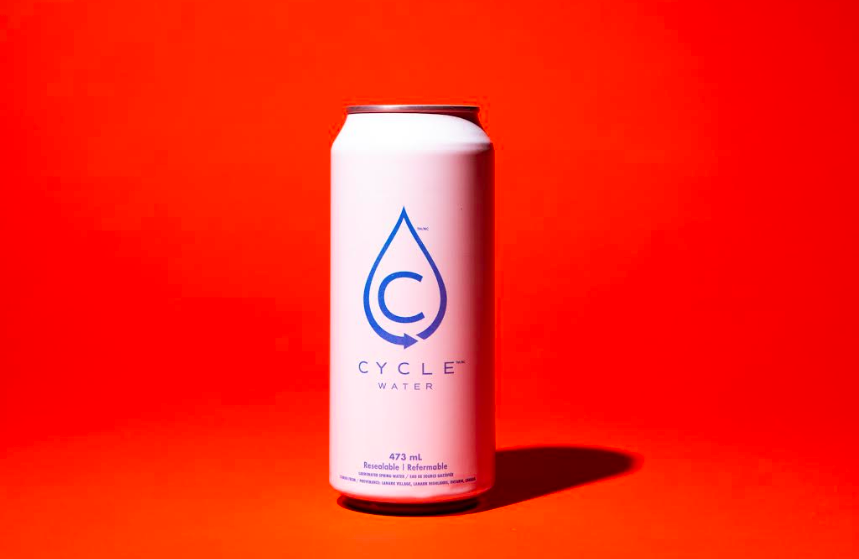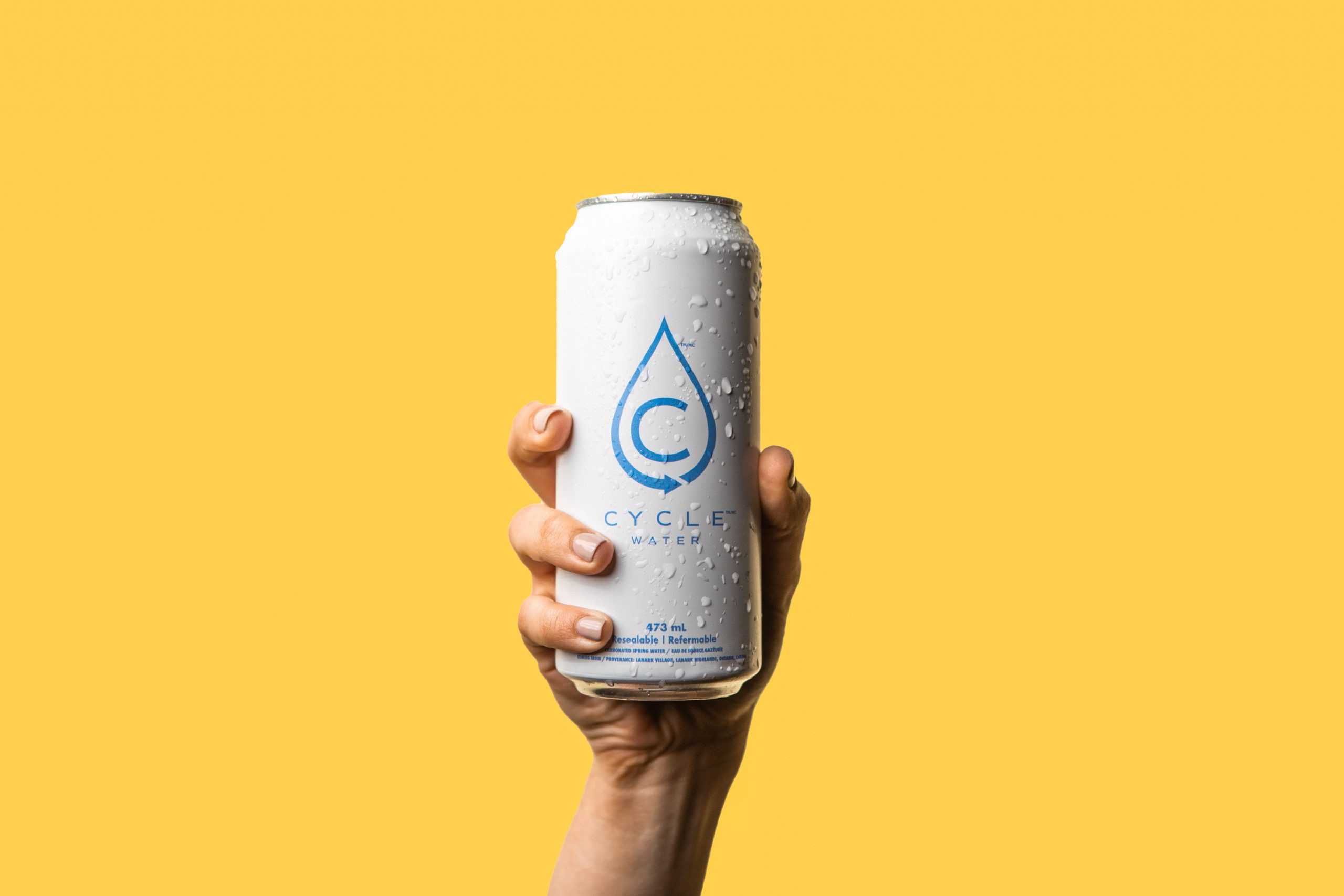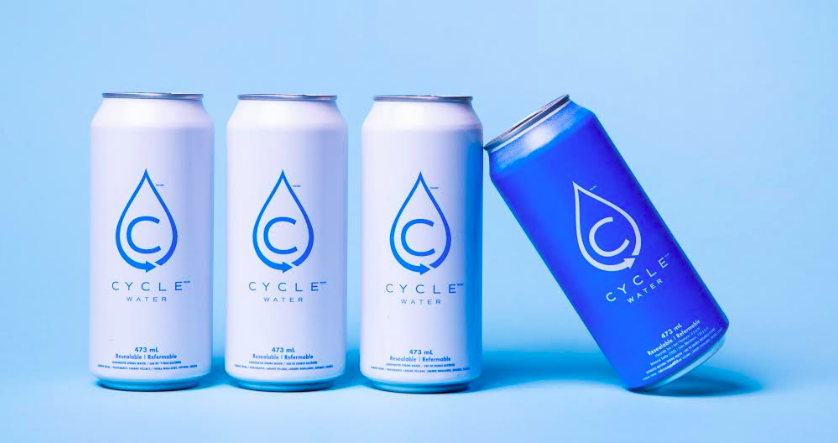Sustainability is a priority to many people living in 2021. With the climate change crisis threatening our way of life, movements such as zero-waste have taken the world by storm and dramatically changed our lifestyles. However, not everyone can switch to producing no waste due to costs, location, and accessibility.

One of the most convenient yet wasteful products we use in everyday life is the plastic water bottle. Although deemed recyclable, many bottles do not make it to the recycling facility and take a significant amount of time and energy to break down. Fortunately, Cycle Water has created a sensible solution in the form of an infinitely recyclable blue can. Founded by Matthew Maronne and Ryan Kucan in 2018, the idea of Cycle Water stemmed from a “can-do” attitude and the dire need to find an alternative to the millions of plastic water bottles that end up in landfills.
Before starting the packaged water initiative, Matthew was aware of the climate change crisis, but it wasn’t until he began doing his research that he opened his eyes to how dire the waste problem was in Canada. “To be completely honest, I wasn’t the poster child for sustainability. And I’m still not; I’m a human who makes mistakes. I’d say that the early research phase for Cycle Water was discovering how much waste Canadians produced. And worse, we didn’t even recycle it. We shipped it half the world away. I’m a can-do kind of person. I thought, there must be something we can do”.

Matthew and his team are passionate about teaching people the value of aluminum cans and their benefits to the environment. When asked about the biggest misconception he receives about canned water, Matthew reflects, “I think many people, in the beginning, did not understand the importance of aluminum packaging. In our first year, in 2019, people still believed that their plastic bottle was recyclable. They did not know the deep statistics. They just saw the recycle logo on the product and trusted it.
And they were right to trust it”. The Cycle Water team is active on social media and prioritizes human connection first and foremost. They are happy to set the record straight on their mission and the sustainability of their product. “There is no economic incentive for the waste management system to process a plastic bottle effectively. Whereas an aluminum product enters the waste system, there is an incentive because that metal has a value”.

According to the Cycle Water website, a can goes from the recycling bin to being a brand-new can in as little as 60 days. Conveying that message to new customers is rewarding for Matthew. “That inherent value was hard to communicate at first, but every once in a while, there would be someone catching on”.
Cycle Water has made some impressive strides in its three short years and is only growing larger. In 2019, they did 55 different events and activations to solidify their presence in the community. “It was exhausting, but I was at every single one. I loved it. We were really in the community. We tried to do every event that came across our desk”. At the end of that year, Cycle Water had the opportunity to partner with the biggest retailer in the country, which helped them tremendously early in the pandemic.

During the lockdown, Matthew and his team refrained from making impulsive decisions and overspending. “I told my co-founder, Ryan, “Let’s hold off as long as we can, and give us a breakdown on how rapidly we can ramp up production if things blow over.” Fortunately, that decision saved us an insane amount of capital. Although that period between March and May was challenging, we weren’t sitting on excess inventory or contracts in limbo”. Matthew recognizes the hard work and insight of his team. “That was a brilliant decision, strategically, and I give credit to the team.”
Cycle Water is focused on preserving the lifecycle of aluminum and other reusable resources to create a more sustainable future. Matthew frequently thinks about the various cycles in nature and allows that to inspire his work. “There is a beauty to nature’s life cycle. The death of plants in the forest, how they breed life, feeds other animals, and the ecosystem they support. The water cycle is fascinating. There are cycles in everything and its hugely important to think about”.

Everything in nature has its place and serves its purpose, and Cycle Water is confident of its role in the sustainability movement. Prioritizing balance, the plastic bottle alternative is meant to provide accessibility to those who want to reduce their ecological footprint but do not know where to start. “We’re not going to be your zero-waste alternative. There are super effective people at minimizing waste, to the point that they don’t produce any. Then, some are extra-large producers. Cycle wants to be that middle ground for people on the far side, who haven’t begun their sustainability journey, to feel like it’s an easy transition. To go from your plastic water bottle to Cycle Water”.
Cycle Water has recently released its new sparkling water product, differentiating itself from its still water counterpart in a white can. For more information on the noble work of Cycle Water, visit https://www.cyclewater.com/






